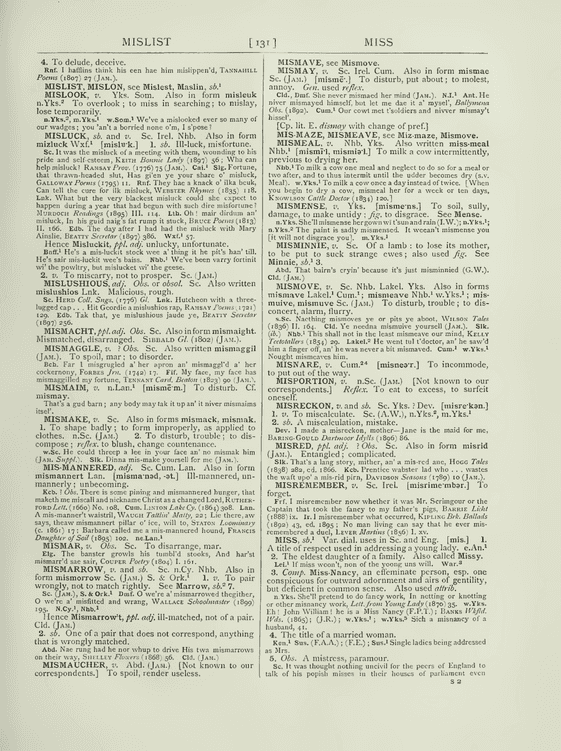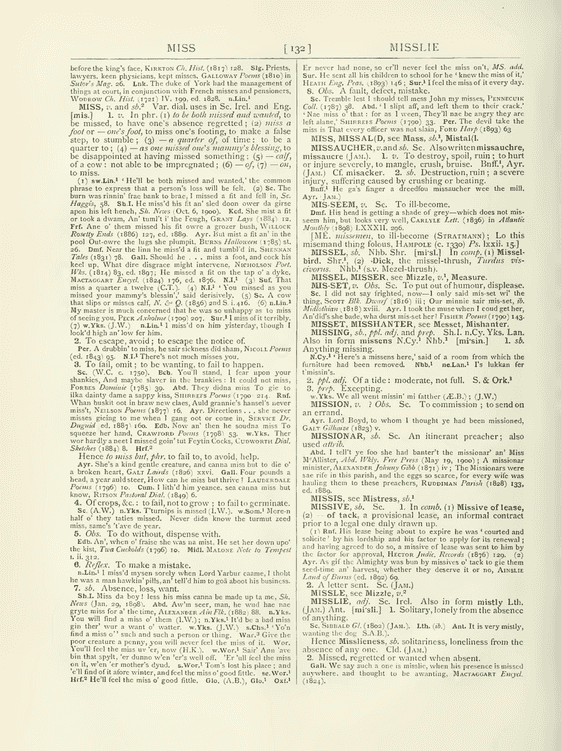Miss
Source : Wright, Joseph English Dialect Dictionary
MISS, sb.1 Var. dial. uses in Sc. and Eng. [mis.] 1. A title of respect used in addressing a young lady. e.An.1 2. The eldest daughter of a family. Also called Missy. Lei.1 If miss woon't, non of the yoong uns will. War.3 3. Comp. Miss-Nancy, an effeminate person, esp. one conspicuous for outward adornment and airs of gentility, but deficient in common sense. Also used attrib. n.Yks. She'll pretend to do fancy work, In netting or knotting or other misnancy work, Lett. from Young Lady (1870) 35. w.Yks. Eh! John William! he is a Miss Nancy (F.P.T.); Banks Wkfld. Wds. (1865); (J.R.); w.Yks.1; w.Yks.5 Sich a misnancy of a husband, 41. 4. The title of a married woman. Ken.1 Sus. (F.A.A.); (F.E.); Sus.1 Single ladies being addressed as Mrs. 5. Obs. A mistress, paramour. Sc. It was thought nothing uncivil for the peers of England to talk of his popish misses in their houses of parliament even before the king's face, Kirkton Ch. Hist. (1817) 128. Slg. Priests, lawyers, keen physicians, kept misses, Galloway Poems (1810) in Sutor's Mag. 26. Lnk. The duke of York had the management of things at court, in conjunction with French misses and pensioners, Wodrow Ch. Hist. (1721) IV. 199, ed. 1828. n.Lin.1
MISS, v. and sb.2 Var. dial. uses in Sc. Irel. and Eng. [mis.] 1. v. In phr. (1) to be both missed and wanted, to be missed, to have one's absence regretted; (2) miss a foot or miss one's foot, to miss one's footing, to make a false step, to stumble; (3) miss a quarter of, of time: to be a quarter to; (4) miss as one missed one's mammy's blessing, to be disappointed at having missed something; (5) miss calf, of a cow: not able to be impregnated; (6) miss of, (7) miss on, to miss. (1) sw.Lin.1 ‘He'll be both missed and wanted,’ the common phrase to express that a person's loss will be felt. (2) Sc. The burn was rinnin' frae bank to brae, I missed a fit and fell in, Sc. Haggis, 58. Sh.I. He miss'd his fit an' sled doon ower da girse apon his left hench, Sh. News (Oct. 6, 1900). Kcd. She mist a fit or took a dwam, An' tuml't i' the Feugh, Grant Lays (1884) 12. Frf. Ane o' them missed his fit owre a grozer bush, Willock Rosetty Ends (1886) 127, ed. 1889. Ayr. But mist a fit an' in the pool Out-owre the lugs she plumpit, Burns Halloween (1785) st. 26. Dmf. Near the linn he miss'd a fit and tumbl'd in, Shennan Tales (1831) 78. Gall. Should he... miss a foot, and cock his keel up, What dire disgrace might intervene, Nicholson Poet. Wks. (1814) 83, ed. 1897; He missed a fit on the tap o' a dyke, Mactaggart Encycl. (1824) 176, ed. 1876. N.I.1 (3) Suf. That miss a quarter a twelve (C.T.). (4) N.I.1 ‘You missed as you missed your mammy's blessin',’ said derisively. (5) Sc. A cow that slips or misses calf, N. & Q. (1856) 2nd S. i. 416. (6) n.Lin.1 My master is much concerned that he was so unhappy as to miss of seeing you, Peck Axholme (1709) 207. Sur.1 I miss of it terribly. (7) w.Yks. (J.W.) n.Lin.1 I miss'd on him yisterday, though I look'd high an' low fer him. 2. To escape, avoid; to escape the notice of. Per. A drubbin' to miss, he sair sickness did sham, Nicoll Poems (ed. 1843) 95. N.I.1 There's not much misses you. 3. To fail, omit; to be wanting, to fail to happen. Sc. (W.C. c. 1750). Bch. You'll stand, I fear upon your shankies, And maybe slaver in the brankies: It could not miss, Forbes Dominie (1785) 39. Abd. They didna miss To gie to ilka dainty dame a sappy kiss, Shirrefs Poems (1790) 214. Rnf. Whan buskit oot in braw new claes, Auld grannie's hansel's never miss't, Neilson Poems (1877) 16. Ayr. Directions... she never misses gieing to me when I gang oot or come in, Service Dr. Duguid (ed. 1887) 160. Edb. Now an' then he soudna miss To squeeze her hand, Crawford Poems (1798) 53. w.Yks. Ther wor hardly a neet I missed goin' tut Feytin Cocks, Cudworth Dial. Sketches (1884) 8. Hrf.2 Hence to miss but, phr. to fail to, to avoid, help. Ayr. She's a kind gentle creature, and canna miss but to die o' a broken heart, Galt Lairds (1826) xxvi. Gall. Four pounds a head, a year auld steer, How can he miss but thrive? Lauderdale Poems (1796) 10. Cum. I lith'd him yeance, sea canna miss but know, Ritson Pastoral Dial. (1849) 6. 4. Of crops, &c.: to fail, not to grow; to fail to germinate. Sc. (A.W.) n.Yks. T'turnips is missed (I.W.). w.Som.1 More-n half o' they taties missed. Never didn know the turmut zeed miss, same's 't'ave de year. 5. Obs. To do without, dispense with. Edb. An', when o' fraise she was na mist, He set her down upo' the kist, Twa Cuckolds (1796) 10. Midl. Malone Note to Tempest I. ii. 312. 6. Reflex. To make a mistake. n.Lin.1 I miss'd mysen sorely when Lord Yarbur caame, I thoht he was a man hawkin' pills, an' tell'd him to goä aboot his business. 7. sb. Absence, loss, want. Sh.I. Miss da boy! less his miss canna be made up ta me, Sh. News (Jan. 29, 1898). Abd. Aw'm seer, man, he wud hae nae gryte miss for a' the time, Alexander Ain Flk. (1882) 88. n.Yks. You will find a miss o' them (I.W.); n.Yks.1 It'd be a bad miss gin ther' wur a want o' watter. w.Yks. (J.W.) s.Chs.1 ‘Yo'n find a miss o'’ such and such a person or thing. War.3 Give the poor creature a penny, you will never feel the miss of it. Wor. You'll feel the miss uv 'er, now (H.K.). w.Wor.1 Sair' Ann 'ave bin that spylt, 'er dunno w'en 'er's well off. 'Er 'ull feel the miss on it, w'en 'er mother's dyud. s.Wor.1 Tom's lost his place; and 'e'll find of it afore winter, and feel the miss o' good fittle. se.Wor.1 Hrf.2 He'll feel the miss o' good fittle. Glo. (A.B.), Glo.1 Oxf.1 Er never had none, so er'll never feel the miss on't, MS. add. Sur. He sent all his children to school for he ‘knew the miss of it,’ Heath Eng. Peas. (1893) 146; Sur.1 I feel the miss of it every day. 8. Obs. A fault, defect, mistake. Sc. Tremble lest I should tell mess John my misses, Pennecuik Coll. (1787) 38. Abd. ‘I slipt aff, and left them to their crack.’ ‘Nae miss o' that: for as I ween, They'll nae be angry they are left alane,’ Shirrefs Poems (1790) 33. Per. The devil take the miss is That every officer was not slain, Ford Harp (1893) 63.

